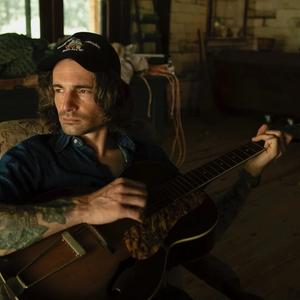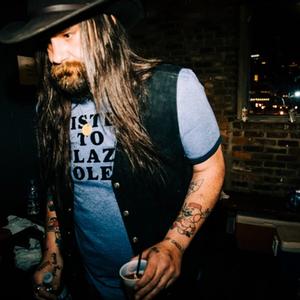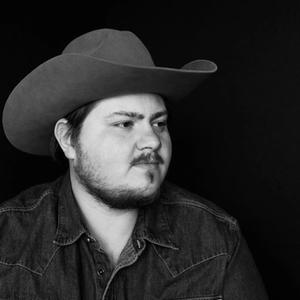
Exclusive: Benjamin Tod Talks Building Networks For Artists, Community and the Need for Change
By Alli Patton




Link copied

Relief.
That’s what Benjamin Tod felt following his Grand Ole Opry debut this past May. Not necessarily because the performance was over, or the enviable moment of stepping onto that iconic stage had been ticked off some list, but he felt relief that all the ceremonial brouhaha would cease once the spotlight was extinguished and all the seats were emptied.
“It was intense,” the Kentucky-based singer-songwriter and Lost Dog Street Band frontman recounts to Holler, following his mid-summer appearance at Railbird Festival. “Before the debut, they bounce you around that backstage. Interview here. Press quote here. Do a little video saying this. Now, it's time to change. Now, get on stage right now.”
It’s not that Tod wasn’t grateful to be there; it’s just that he can often do without the chaos. He’s existed in chaos before, and perhaps, some of the calm that washed over him following that celebrated evening had something to do with surviving such turmoil. “It was an incredible moment for me and my entire family and my community,” he adds. “It's kind of like building a form of hope for everyone who has known me for that many years. To see me having come from so deep in addiction and homelessness, and such a dark place, and then that kind of being the peak triumph was incredible.”
For years, Tod has been candid about his struggles with addiction, having been under the influence of alcohol, methamphetamine and heroin for nearly a decade, and has been open about his subsequent road to recovery. In this way, he’s become a beacon to those in his community and a sage within the music industry, applying his experience and hard-earned wisdom toward dreaming up a brighter future for his Muhlenberg County home and a better working environment for his fellow artists.
While an Opry debut is undoubtedly a career highlight for many country musicians, it’s not one that makes or breaks an artist like Tod, especially at this point in his journey, where more than just hits but his health and happiness are on the line. “This is more of a hobby for me at this point,” he says of his music. “My life is back in Muhlenberg, working with heavy equipment and getting grease and sweat all over me. I guess it's still my career, but it's not what my focus is on.”
His focus is rather honed on his Kentucky homestead, the rich community of Muhlenberg County that encircles it, as well as raising awareness surrounding mental health and addiction within the music industry. He’s now using what influence he has to support those who have grappled with the same darkness he himself lived with for years.
He explains, “My intention is to use the platform that I have, the power and the money to a.) benefit my family; and then b.) benefit my community; then hopefully, on top of that, benefit people across the board with mental health issues, recovering from addiction, recovering from just being immoral, recovering from being a villain in their own world.”
The work he’s pouring into the world around him still feeds back into the songs he releases, resulting in visceral tracks that echo equal parts vulnerability and understanding. Earlier this year, a collection of such tunes came in the form of Survived, an unexpected album from the newly resurrected Lost Dog Street Band that illustrated hard work and hard living through staggering story songs.
Now, Tod arrives with Shooting Star, his fourth solo studio effort and the follow-up to 2022’s Songs I Swore I’d Never Sing. Rather than chasing his rocky past across this release, he has taken stock of the music that has, for years, informed his own, drawing inspiration from a storied country songbook in order to craft the ultimate modern honky tonk collection.
In addition to reflecting on healing and change, Tod discusses the highlights of his past year, shares the work he’s doing in his community and drives home the importance of mental health in the music industry.
On the work he’s doing for his community:
I'm Vice President [of the Muhlenberg Music Mission], and we have an incredible board of directors with people sprinkled throughout different avenues of the community and the local government, business owners here and there. It is stronger than ever. People have come out of the woodwork, and it's become iron sharpening iron.”
On needing to see a change in the music industry:
“This lifestyle will make you fucking crazy … I see it all the time.
There are artists who are on the road right now that I know they're losing it, but their management is going to push them as far as they're going to push them. And there's nothing I can do about it. It's their decision, but everyone needs to take a break from time to time and reset because if you're trusting your management to decide where the line is, there's not a line.
It's like, ‘Hey, you're having a lot of issues, but can you just get on stage and do this one more thing?’ And, ‘Oh well, this came up now.’ And, ‘Oh well, you got offered this big opening slot playing stadiums, can you just squeak by for another month after you've been going crazy for six months?’ It eventually breaks.
I really wish that we didn't have to wait for disaster to strike in these performance communities in order for things to be taken seriously and to change. Most of the people that I know in the performing community, the artist community, they're pushed to their limits consistently, and it's not fair.”
On the importance of creating a network of artists for artists:
I think communication is number one. It'd be nice if there was a kind of network of artists, because artists are the only people who can help other artists.
I've been there. I've been in moments where I have been having mental breakdowns, and I wanted desperately to walk out of a venue and go to a psych ward and didn't … It's a really hard call, but I think it's a call you should potentially make with someone who actually understands.
There should be a network between managers and artists, like if someone's on the road, they're like, ‘Oh, this person's having a hard time.’ If they're someone in my community, like if Sam Barber was having a hard time. It's like, ‘Hey, why don't you reach out to Benjamin Tod? He's on this list of people who's available right now to talk about your mental health and kind of work through it and make a decision.’
I think that would be a great idea, and I think there are networks like that, seemingly in Nashville, but I think the leaders in this community need to outreach more and need to be more involved with people who are coming up and people who generally have issues. That's who I try to be, in general in the community - someone that is friendly and available and who cares.”
On the most important lessons for the road:
“There are objective things that you can do to make your time easier on the road and these younger guys aren't necessarily taught those tricks. There are breathing exercises. There are things that you have got to pay attention to. You’ve also got to pay attention to your crew and who you keep in your circle, not just them being good people, but also being good influences. Do you have someone on your crew that's trying to drag you out at 11 p.m. every night and fucking drink till dawn? You can't do it at this level. There are tricks of the trade that help with your mental health tenfold”.
For more on Benjamin Tod, see below:





